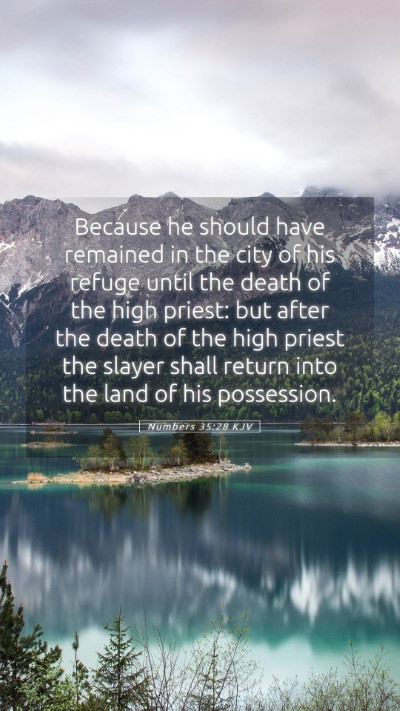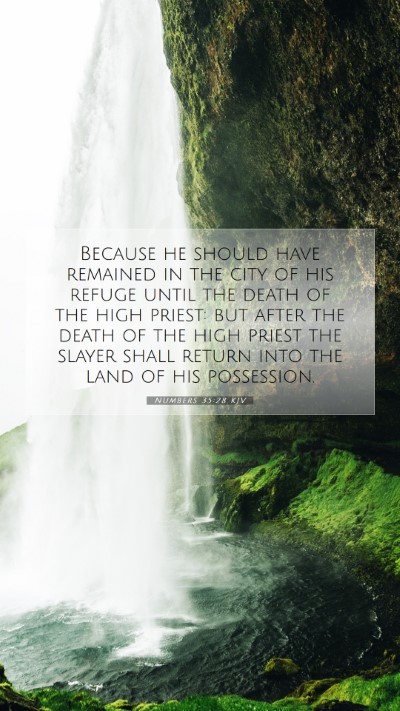Bible Verse Meaning of Numbers 35:28
Numbers 35:28 states: "Because he should have remained in his city of refuge until the death of the high priest; but after the death of the high priest the slayer shall return into the land of his possession."
This verse is part of the legal provisions concerning the cities of refuge in ancient Israel, where an individual could seek protection from avengers of blood. The significance of this verse can be understood through the insights provided by public domain commentaries.
Summary of Insights from Commentaries
-
Matthew Henry:
Matthew Henry highlights the importance of adhering to God’s commands regarding the cities of refuge. He explains that the towns served as places of safety for those who accidentally committed manslaughter. The requirement to remain in the city until the high priest's death emphasizes the idea of divine justice and mercy.
-
Albert Barnes:
Albert Barnes points out that the death of the high priest symbolizes the end of an era and the totality of God's provisions for justice. He elaborates on the practical implications of this law, stressing that the murderer, who fled in haste, must take responsibility for his actions and not exploit the sanctuary symbolically provided for him.
-
Adam Clarke:
Adam Clarke elaborates on the concept of refuge and the high priest's role in the preservation of public justice and mercy. He notes that this system served to protect life while also allowing for accountability. Clarke underscores that the prescribed duration of refuge served as a symbolic gesture of the sanctity of life.
Understanding the Themes
The overarching themes encapsulated in Numbers 35:28 include:
- Justice: The law reinforces the necessity for justice to coexist with mercy.
- Accountability: It acknowledges the importance of personal responsibility for one's actions.
- Divine Provision: God provides systems for both protection and reconciliation, demonstrating His commitment to justice and mercy.
Biblical Exegesis and Application
In conducting a scriptural analysis of this verse, one notices the implications for both ancient and modern contexts. The verse addresses the necessity of accepting consequences for one's actions, which is a relevant teaching for personal conduct today.
Moral Application
Every believer is encouraged to reflect on their own lives in light of this verse. Understanding the significance of justice and mercy allows individuals to engage in more meaningful Bible study lessons, recognizing how principles from the Old Testament can apply to contemporary life.
Biblical Cross References
This verse connects to several other passages in scripture, enhancing its interpretation:
- Exodus 21:12-14: Discusses the laws surrounding manslaughter and intentional murder.
- Deuteronomy 19:4-6: Provides specific details on the cities of refuge.
- Hebrews 6:19: Uses the concept of refuge as a metaphor for Christ, our ultimate sanctuary.
Conclusion
Numbers 35:28 serves not only as a legal guideline for ancient Israel but also as a profound teaching on the balance of mercy and justice in God's creation. Understanding this verse enriches our Bible verse meanings and interpretations, offering foundational insights for deeper engagement with Scripture.
Invitation for Further Study
For those seeking to deepen their understanding of such passages, joining a Bible study group or utilizing comprehensive Bible study tools can provide invaluable resources. Exploring the historical context and applying these teachings to daily life fosters a richer spiritual experience.


